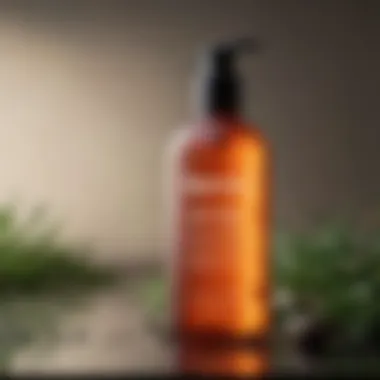Top Acne Body Washes for Oily Skin Revealed


Intro
Acne is a common skin condition that affects many people, particularly those with oily skin. Understanding how to manage this condition is critical. One effective way to do so is by selecting the right body wash. The correct product can help control oil production, prevent breakouts, and enhance overall skin health. This article aims to explore the best acne body washes tailored for oily skin, looking into their ingredients and benefits.
Key Trends
Current Understanding of Acne Treatment
There is a growing awareness of acne as more than just a teenage issue. People of all ages are increasingly affected by acne, especially women. The trend is shifting towards products that not only treat acne but also incorporate beneficial skin care ingredients. Many body washes now combine salicylic acid, benzoyl peroxide, and natural extracts to address both acne and oily skin problems effectively.
Popular Body Wash Trends
Consumers are leaning towards body washes that prioritize gentle yet effective formulations. This shift includes:
- Natural Ingredients: Many shoppers prefer products with botanical extracts over harsh chemicals.
- Multi-Function Products: The demand for body washes that can also hydrate and tone the skin is rising.
- Sustainable Choices: Eco-conscious consumers search for brands that offer sustainable packaging and cruelty-free products.
"The quest for healthier skin has led to innovative formulations in body washes that cater specifically to acne-prone and oily skin."
Beauty Tips and Product Selection
Choosing the Right Product
When selecting an acne body wash for oily skin, prioritize the following ingredients:
- Salicylic Acid: Penetrates pores to eliminate excess oil and dead skin cells.
- Benzoyl Peroxide: Kills acne-causing bacteria and helps reduce inflammation.
- Tea Tree Oil: Natural antibacterial properties that soothe and prevent breakouts.
- Glycolic Acid: Gently exfoliates and enhances skin cell turnover.
Application Techniques
- Consistency is Key: Use your body wash daily to see optimal results.
- Avoid Over-Washing: Two times a day is usually sufficient for oily skin to prevent irritation.
Maintaining Overall Skin Health
In addition to using an acne body wash, consider these tips to support your skin:
- Moisturize Regularly: A light moisturizer can help balance oil levels.
- Stay Hydrated: Drinking water can improve skin texture and overall health.
- Monitor Diet: A balanced diet influences skin health. Consider reducing sugar and dairy intake as part of your skincare strategy.
This guide provides insight into how to select the best acne body wash suitable for oily skin. By understanding key ingredients and maintaining effective skincare routines, individuals can work towards clearer skin.
Prolusion to Acne and Oily Skin
Acne is a common skin condition that can affect individuals at any age, but it often becomes a significant concern during adolescence. Oily skin, characterized by excess sebum production, frequently accompanies acne. Understanding the relationship between these two factors is essential. This article will delve into the characteristics of oily skin and the ways it interacts with acne, leading to breakouts and skin issues.
The focus on selecting effective body washes is pivotal as they serve as the first line of defense. The right product can help manage both acne and oil levels, promoting clearer skin. Body washes designed with specific ingredients can address the needs of oily skin, ultimately enhancing overall skin health. Furthermore, recognizing the unique requirements of oily skin can help individuals make informed choices in their skincare routines.
Definitions and Characteristics
Acne is typically characterized by the presence of pimples, blackheads, and cysts. It occurs when hair follicles become clogged with oil and dead skin cells. This blockage is often exacerbated by bacteria, leading to inflammation and breakouts. Oily skin, on the other hand, is marked by a shiny appearance and enlarged pores, frequently resulting from a higher production of sebum from sebaceous glands.
Oily skin can lead to several concerns:
- Increased likelihood of acne.
- Shiny complexion, especially in the T-zone.
- Clogged pores, leading to blackheads and whiteheads.
- Changes in skin texture, possibly resulting in roughness over time.
These characteristics inform the need for targeted cleansing products that can effectively address oiliness without overly drying or irritating the skin.
Understanding the Causes of Oily Skin
Determining why skin becomes oily is crucial. Several factors contribute:
- Genetics: Family history plays a role in skin type and sebum production.
- Hormones: Fluctuations, especially during puberty and menstrual cycles, can lead to increased oiliness.
- Diet: High-glycemic foods and dairy can impact oil production.
- Weather: Heat and humidity can exacerbate skin oiliness.
Addressing these causes through effective skincare can assist in managing oily skin. It is necessary to choose body washes that are capable of controlling excess oil while treating acne, thus preserving skin health and appearance.


Impact of Body Washes on Skin Health
Cleansing the skin is a fundamental part of any skincare routine. It helps to remove dirt, excess oils, and impurities that can lead to breakouts, especially for individuals with oily skin. The choice of body wash is particularly important, as it can significantly impact the overall health of the skin. For those grappling with acne, selecting an appropriate body wash can be transformative. Rich in specific ingredients, these products not only cleanse but also provide treatment and prevention against future breakouts.
Cleansing products serve as the first line of defense against acne. They remove the build-up of oil and bacteria that can clog pores and lead to inflammation. A body wash that is designed for oily skin typically contains active ingredients that target acne, such as salicylic acid or benzoyl peroxide. These ingredients provide deep cleansing properties and can aid in exfoliation, which is essential for preventing the formation of new blemishes.
The benefits of using the right body wash extend beyond merely tackling existing acne. Regular use of a well-formulated wash can contribute to keeping the skin balanced, preventing it from becoming overly oily or dry. This balance is crucial as fluctuations in oil levels can exacerbate acne conditions. Consequently, understanding the correct role of body washes is vital for maintaining skin health and preventing future breakouts.
Role of Cleansing Products
The role of cleansing products is to eliminate dirt and oil while preparing the skin for further treatment. Using a body wash specifically designed for acne-prone skin can make a substantial difference.
- Deep Cleansing: Effective body washes reach deep into the pores. This allows for the extraction of impurities that can lead to acne.
- Preventive Measures: Regular cleansing with suitable products can prevent the recurrence of acne.
- Soothing Properties: Many body washes include soothing ingredients that help calm irritated skin, thus reducing redness and inflammation.
In summary, the right body wash not only cleans the skin but also lays the foundation for a healthy complexion.
Importance of pH Balance in Body Washes
Maintaining the pH balance of the skin is crucial for its overall health. The skin has a natural pH level, typically around 4.5 to 5.5, which is slightly acidic. This acidity helps to protect against harmful bacteria and environmental factors.
- Acidic vs. Alkaline: When body washes are too alkaline, they can disrupt the skin's natural barrier. This leads to dryness and increased oil production, both of which can aggravate acne.
- Optimal pH Levels: Choosing a body wash that adheres closely to the skin's natural pH is critical. It ensures that the skin's protective barrier remains intact, effectively reducing the likelihood of breakouts.
Using a pH-balanced body wash not only aids in cleansing but also supports the skin’s natural defenses.
Overall, the significance of selecting an appropriate body wash cannot be overstated. It is a fundamental aspect of both treating and preventing acne, especially for those with oily skin. By understanding the impact of cleaning products on skin health and emphasizing pH balance, individuals can make informed choices that contribute to their skin's long-term well-being.
Key Ingredients for Acne Treatment
When selecting an effective body wash for oily skin, understanding the key ingredients that target acne is crucial. These components can directly affect skin health, potentially reducing breakouts and promoting clearer skin. Each ingredient works through unique mechanisms to combat acne while being gentle enough for sensitive skin.
Salicylic Acid
Salicylic acid is often regarded as a cornerstone in acne treatment. It is a beta-hydroxy acid (BHA) that penetrates the pores. This penetration helps to dissolve excess sebum and exfoliate the skin. For those with oily skin, salicylic acid can reduce blockages of pores that can lead to acne. It is particularly effective in treating superficial acne, such as blackheads and whiteheads. Users might appreciate the added benefit of salicylic acid’s anti-inflammatory properties, which can help minimize redness and swelling.
Benzoyl Peroxide
Benzoyl peroxide is another well-known ingredient in acne treatment. It works by releasing oxygen into the pores, killing the bacteria that contribute to acne formation. This ingredient is effective in addressing both existing acne and preventing future outbreaks. Users should consider starting with lower concentrations to assess skin tolerance, as it can sometimes cause dryness or irritation. Combining benzoyl peroxide with a moisturizer may be beneficial for maintaining skin hydration while treating acne.
Tea Tree Oil
Tea tree oil has become a popular natural alternative to synthetic acne treatments. It possesses antimicrobial properties, which can help combat acne-causing bacteria. Additionally, tea tree oil also has anti-inflammatory effects, which can soothe redness and the irritation associated with acne. Many users find that it is less irritating than some traditional treatments. However, it is vital to use diluted tea tree oil, as applying it directly can lead to skin sensitization.
Cetearyl Alcohol and Its Benefits
Cetearyl alcohol is a fatty alcohol that sometimes appears in formulations aimed at oily skin. Although it is an alcohol, it is not drying. Instead, it acts as an emulsifier, helping to blend various ingredients in a product and improve texture. Cetearyl alcohol can also provide moisturization without clogging pores. By including this ingredient, manufacturers help ensure that the body wash maintains an optimal moisture level while cleaning the skin effectively.
In summary, these key ingredients play a significant role in the treatment of acne for individuals with oily skin. Selecting a body wash that combines these elements can enhance the overall effectiveness of an acne regimen. Understanding how each component functions can help consumers make informed choices for their specific skin needs.
Selecting the Right Body Wash for Oily Skin
Choosing the right body wash is crucial for individuals with oily skin prone to acne. The products you use directly affect your skin’s health. Selecting an effective body wash can help to reduce excess oil, clear up breakouts, and prevent new acne from forming. Moreover, the right formula can maintain the skin’s natural balance, which is essential for keeping it healthy and vibrant.
Identifying Individual Skin Types
Understanding your specific skin type is the first step in selecting the ideal body wash. Oily skin often appears shiny, particularly in the T-zone, and may have enlarged pores. In contrast, some individuals may experience combination skin, where certain areas are oily while others are normal or dry. Identifying whether your skin is purely oily or a mix will influence your choice of product. Medical professionals suggest customizing your skincare based on these features.
Product Labels and Ingredients to Look For
When examining body wash options, pay attention to product labels closely. Look for key ingredients known for combating oily skin and acne. Salicylic acid is often featured, renowned for its ability to penetrate pores and dissolve trapped dirt and oil. Benzoyl peroxide is another powerful tool, killing bacteria on the skin’s surface. Natural ingredients such as tea tree oil can also offer bacterial-fighting properties without being overly harsh. Ensure that the product is labeled as non-comedogenic, which means it won’t clog pores. This aspect is vital to prevent further breakouts.
Avoiding Harsh Chemicals


While it’s tempting to choose the strongest formulations available, it’s important to avoid harsh chemicals. Alcohol and sulfates can disrupt the skin’s natural barrier, leading to irritation or increased oil production. Harsh scrubs can also exacerbate acne by inflaming the skin. Always opt for gentle, sulfate-free cleansers that avoid stripping your skin of its essential oils while still effectively managing oiliness.
"Selecting the right body wash is a blend of understanding your skin type and knowing which ingredients can actively combat your skin concerns without causing further issues."
By taking these factors into consideration, you can find a body wash that addresses your oily skin needs while supporting overall skin health.
Top Recommendations for Acne Body Washes
Choosing an effective body wash is crucial for managing oily skin and acne. The right product can significantly influence skin health and appearance. Selecting products with specific ingredients can lead to clearer skin and reduced breakouts. Each recommendation below has been selected based on its formulation, effectiveness, and popularity among consumers.
Product Reviews and Effectiveness
Brand A
Brand A provides a unique formulation that targets acne while calming inflammation. It is known for its salicylic acid base, which helps to penetrate deep into pores. This characteristic makes Brand A an effective choice for those seeking to manage breakouts. The added bonus of natural oils in the formulation provides moisture without adding excess oil, which is essential for oily skin.
Pros:
- Deep pore cleansing
- Hydrating properties without excess oil
- Reduces redness and promotes healing
Cons:
- Some users report tingling sensation during use, which may not be suitable for sensitive skin.
Brand B
Brand B is notable for its Benzoyl Peroxide content, which is highly effective at combating acne. This ingredient helps to kill bacteria that lead to breakouts. Brand B focuses on a gel-like consistency, making it easy to apply and rinse off. Its effectiveness in diminishing existing acne makes it a favored choice among individuals struggling with persistent breakouts.
Pros:
- Fast-acting and effective for current acne
- Lightweight texture
- Easily accessible at most retailers
Cons:
- May cause excessive dryness for some users; regular moisturizing is necessary.
Brand
Brand C incorporates tea tree oil, famous for its antibacterial properties. This brand is celebrated for promoting healthy skin without harsh chemicals. Its gentle yet effective formula makes it popular among users with sensitive skin. Brand C's focus on natural ingredients makes it more appealing for those looking for a more holistic skincare routine.
Pros:
- Natural and soothing
- Works well for sensitive and oily skin types
- Great long-term skin health benefits
Cons:
- Results may take more time compared with stronger formulations.
Comparative Analysis of Features
When comparing these brands, consider several factors.
- Ingredient Efficacy: All brands contain key ingredients that target acne effectively, though they differ in formulation.
- Skin Compatibility: Brand A is hydrating, Brand B is strong for current breakouts, and Brand C is gentle for sensitive skin. Choose based on your skin needs.
- Availability: Accessibility varies; Brand B tends to be widely available in stores, while Brand C may be found in specialty shops or online.
Effectiveness for managing oily skin and acne varies per user, so testers of each product often have different experiences. The right choice also depends on individual preferences regarding skin feel and ingredient transparency.
Finally, an informed selection of the right body wash can greatly enhance the skincare routine of anyone dealing with oily skin and acne.
Application Techniques for Maximum Results
Understanding how to apply body wash effectively is crucial for individuals with oily skin, especially those facing acne. Choosing the right products goes hand in hand with effective application techniques that enhance the benefits of these cleansers. Proper methods help in removing excess oils and acne-causing bacteria while minimizing skin irritation.


Proper Cleansing Methods
To ensure the body wash works effectively, start by wetting the skin thoroughly. Warm water can assist in opening the pores and preparing the skin for cleansing. Squeeze out a small amount of the acne body wash onto your palm or a clean washcloth.
- Lathering: Work the product between your hands or on the washcloth to create a rich lather before applying it onto the affected areas. This step is crucial as it helps in distributing the active ingredients evenly on the skin's surface.
- Gentle Application: Use gentle circular motions to massage the body wash into your skin. Avoid scrubbing too hard, as aggressive friction can irritate the skin and possibly worsen acne. Focus on oily areas, typically the back, chest, and shoulders.
- Rinsing: Rinse thoroughly with cool water, which can help close the pores. Ensure no product residue remains, as leftover wash can lead to irritation and more breakouts.
Overall, employing the right cleansing methods enhances the efficacy of acne body washes and better prepares the skin for subsequent skincare steps.
Frequency of Use
Determining how often to use an acne body wash is essential. For oily skin, frequent cleansing is necessary but should be balanced to avoid over-stripping the skin. The following points provide a guideline for optimal frequency:
- Daily Use: Most individuals with oily skin can benefit from using their body wash once or twice a day. Morning and evening sessions can remove accumulated oils and impurities, keeping the skin clearer.
- Sensitive Skin Consideration: If your skin becomes irritated or significantly dry after using a body wash, consider reducing the frequency. Listen to your body—if irritation arises, it might be helpful to switch to a milder formula.
- Seasonal Adjustments: Weather changes can affect skin oiliness. Oily skin may be more pronounced during warmer seasons. Adjust the frequency accordingly based on skin condition.
In summary, the key to effective application techniques lies in the method of cleansing and the frequency of use. With proper techniques, the chances of achieving clear skin are significantly improved.
Complementary Skincare Practices
Complementary skincare practices play a crucial role in the management of oily skin and acne. While selecting the right acne body wash is fundamental, it is equally important to incorporate other skincare habits that enhance and support the effectiveness of these products. Proper skincare routines can significantly improve skin quality, leading to a healthier and more balanced complexion.
One of the primary components of any effective skincare regimen is moisturizing post-cleansing. Many believe that oily skin does not need moisturizing, but this is a common misconception. Skin can produce excess oil in compensation for being stripped of moisture. By applying a lightweight moisturizer after cleansing, you help maintain the skin's hydration levels. Look for non-comedogenic products that won’t clog pores. Ingredients like hyaluronic acid are beneficial as they provide moisture without adding oiliness.
Moisturizing Post-Cleansing
After using an acne body wash, it is essential to moisturize. Immediately replenishing skin moisture post-cleansing prevents the skin from becoming dry and irritated. A well-moisturized skin barrier protects against environmental aggressors, which can worsen acne.
- Use Lightweight Formulas: Choose a moisturizer that is oil-free and labeled as non-comedogenic.
- Timing Matters: Apply moisturizer right after cleansing, while skin is still damp, to lock in hydration.
Incorporating a moisturizer into your routine not only balances oil production but also enhances the overall effectiveness of acne treatments.
Incorporating Exfoliation
Exfoliation is often overlooked but is an important aspect of skincare for oily, acne-prone skin. Regular exfoliation helps to remove dead skin cells that can clog pores, leading to breakouts. It promotes cellular turnover, revealing fresher skin beneath. There are different types of exfoliants available:
- Physical Exfoliants: These are scrubs or brushes that manually remove dead skin. Use them gently, about once a week to avoid irritation.
- Chemical Exfoliants: Ingredients like glycolic acid or salicylic acid dissolve dead skin cells and can be more effective for oily skin. They can be used more frequently than physical treatments.
Applying exfoliants regularly can not only reduce the occurrence of acne but also improve skin texture and tone. The key is moderation; over-exfoliating can lead to skin irritation and exacerbate oiliness.
In summary, complementary skincare practices such as proper moisturizing and regular exfoliation significantly enhance the results of acne body washes. They work synergistically to promote optimal skin health for those with oily skin.
Long-Term Maintenance of Oily Skin
Maintaining healthy skin over the long term is crucial for individuals with oily skin prone to acne. While selecting the right acne body wash is a pivotal step, it is merely one part of a multifaceted approach to skincare. Long-term maintenance encompasses daily habits, dietary choices, and possibly medical advice, all of which play significant roles in skin health and acne management.
Lifestyle and Dietary Considerations
Making informed lifestyle and dietary decisions can greatly impact the condition of oily skin. A balanced diet rich in antioxidants, vitamins, and healthy fats promotes skin health. Foods like fruits, vegetables, and whole grains nourish the body while minimizing inflammation. Conversely, high-glycemic foods, such as sugary snacks and beverages, can exacerbate acne symptoms.
Regular hydration is also essential. Drinking adequate water helps detoxify the body and maintain skin elasticity. Additionally, limiting dairy and processed food can contribute positively. These dietary adjustments are not instant fixes; they promote gradual improvements in skin condition over time.
When to Consult a Dermatologist
While many can manage oily skin with over-the-counter solutions and lifestyle adjustments, the guidance of a dermatologist is invaluable under certain circumstances. If acne persists beyond home remedies, or exacerbates in severity, consulting a professional is advisable.
A healthcare provider can determine if the acne stems from underlying conditions, such as hormonal imbalances or allergies. They can also recommend prescription treatments that might include topical or oral medications, which are stronger than standard acne body washes.
Consulting a dermatologist early can prevent long-term skin damage and scarring, offering tailored solutions for effective management.
Routine check-ups can also be important for ongoing skin assessments. Through these visits, one can receive specialized advice based on skin type changes and response to different treatments.
In summary, long-term maintenance of oily skin involves a holistic approach. Combining lifestyle and dietary changes with professional consultations creates a robust foundation for achieving healthier skin. The complexities of acne management necessitate customized strategies that evolve over time.
Closure and Final Thoughts
Choosing a body wash specifically formulated for oily skin with effective ingredients like salicylic acid or benzoyl peroxide can make a notable difference. These components target acne directly, reducing breakouts effectively. Furthermore, they help manage excess oil without compromising the skin's natural barrier.
In addition, the insights on complementary skincare practices, like the necessity of moisturizing after cleansing, highlight the complexity of skin care. A comprehensive approach that combines effective products with supportive practices can optimize results.
"The right body wash is not just about cleansing; it’s about understanding your skin's unique needs and addressing them effectively."
This article also noted the significance of lifestyle and dietary factors in managing oily skin. Long-term maintenance involves integrating healthy habits that support skincare routines. Regular consultations with a dermatologist are advised for personalized treatment and guidance if necessary.
Ultimately, readers should feel empowered to make informed choices about the body washes they use. The knowledge gained here serves not just to combat acne but to foster healthier skin overall. Remember, achieving clear skin may require time, patience, and consistency in your skincare regimen.



